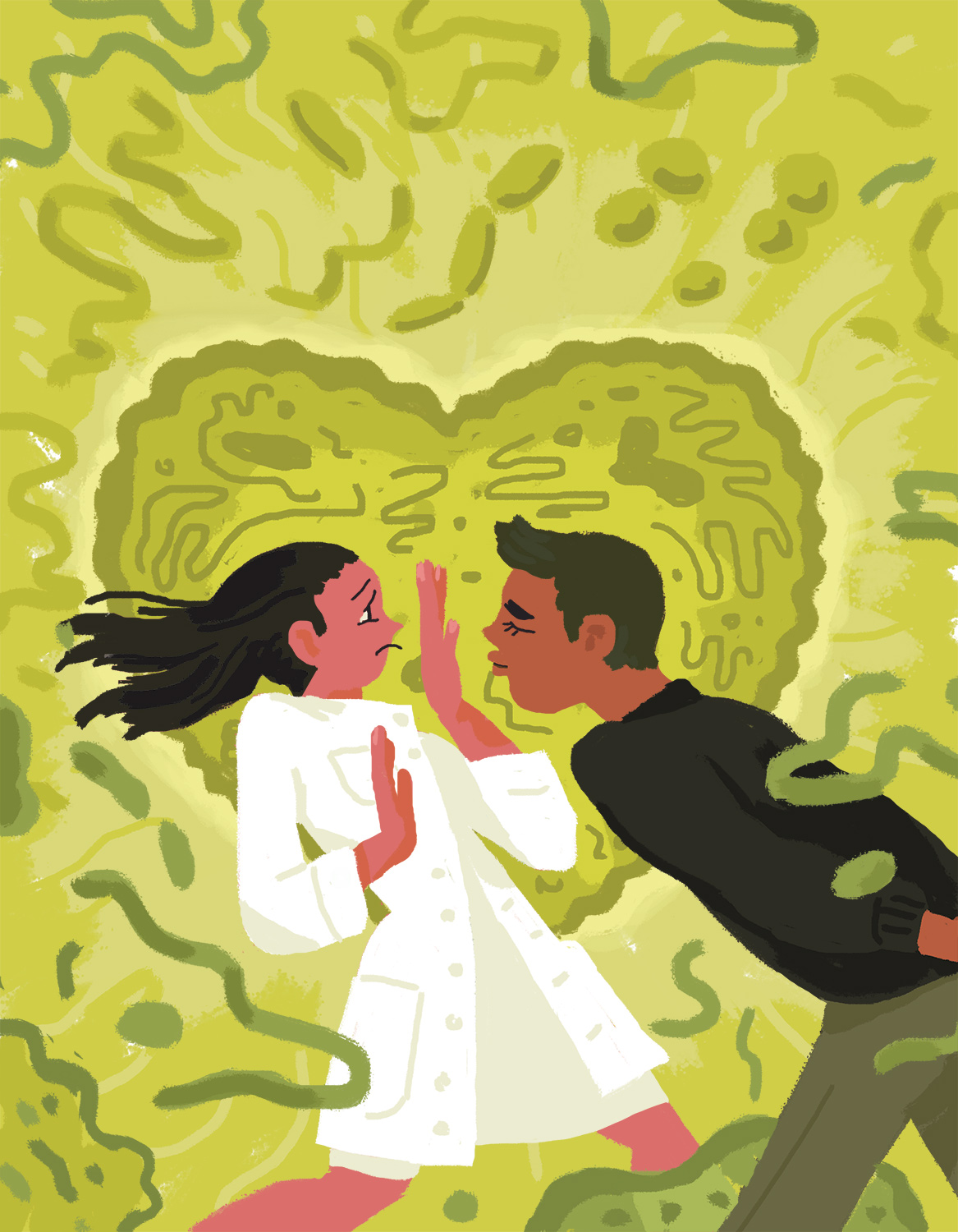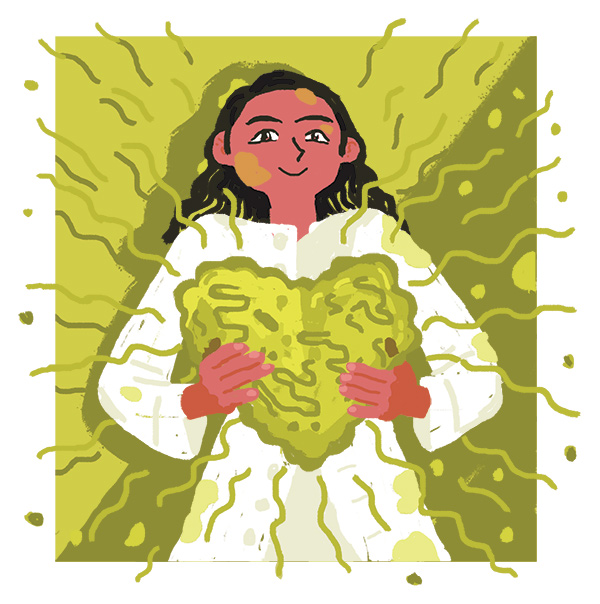
Touch has the power to physically and emotionally bridge the gap between two people. The lack can alternately communicate coldness, depending on the context.
God made me a person who loves and desires touch. I love giving hugs and not letting go. I love patting people on the back and squeezing people's arms in affirmation or excitement when conversing. I genuinely feel loved and supported when people assure me with their touch-gesture.
But I've also been a germophobe for as long as I can remember.
My obsession with washing my hands and germ-tracking began when I was about 7 years old. I remember being a child, playing with snails, dirt, roly-polies, and sharing juice boxes with my brother with no apparent revulsion. I was hanging out at my cousin's house when upon leaving the bathroom, my older cousin said in a startled tone, "Ew, Michelle! Did you just use the bathroom and not wash your hands?" I looked at him with doe eyes. "You're supposed to wash your hands after you use the bathroom. Every time, OK? OK." I knew he was being really nice about it and just trying to teach me. I'm not blaming my surviving oddity on him whatsoever, but that did teach me to be a faithful and vigorous hand washer.
My germophobia became situation-selective. If I can avoid people germs, I will. I don't like giving high-fives or sharing drinks. I shake hands when meeting new people, but I always make a mental note to wash my hands as soon as possible. I love the U.S. because there's a lot of physical space, and I don't like putting myself in situations that get congested with bodies that I might have to rub against. Some times, it really stresses me out that I have to deal with my own discomfort. I tend to make up my mind ahead of time about which germs are going to really bother me, and for the most part, that's how I deal with my germophobia. Somewhere in the midst of all this tension, I found myself becoming a poop scientist.
I majored in biochemistry at Biola University, and afterward, I sought a career in the field of water quality. In college, I experienced life without clean water for the first time when doing earthquake relief work in Haiti. I did my senior thesis presentation on tap water and the various methods of sanitation for potable water; shortly after, I sent out my rÈsumÈ to every water job I could find.

My first interview and my first hire was at the Sanitation Districts of Los Angeles County as a lab technician in the Process Control Group. My job was to test LA County's wastewater at various steps of the cleaning process, including the final product (also known as the "final effluent"), and make sure the quality levels of the water were normal. This meant I had to touch poop; I used gloves, but still, I had to touch poop.
I was open to this kind of work despite my longstanding aversion to all things germs, because I wanted so badly to not be controlled by my fears. I didn't want my personal vendetta against germs to keep me from pursuing a career in a field that I could actually be good at and be interested in. There was definitely something ironic about being drawn to work in a place that was filled with everything I hated; all I can say is that I was intrigued, and I was up for the challenge.
It was the worst. I hated the smell. I could imagine the aerosolized poop particles all over the laboratory and all over my clothes. I would go home, take my soiled shoes and clothes, throw them in the hamper, and take a shower so hot that the temperature alone could disinfect.
Months went by, and I got somewhat used to the exposure. Of course, I was still getting inoculated by flying poop particles on the daily, but by lunchtime, I could wash my hands and arms, and have a nice, big appetite. And I was still a germophobe at my core.
For most of my life, I've been able to get away with this duality of being a germophobe, yet loving and being loved with touch. It affected my thoughts with every invitation for physical contact. If someone reached over to shake my hand, I would go into a split-second panic mode, and then willingly oblige myself to make physical contact. It was a matter of personal choice, of when I'd exactly choose to execute my "Ew, don't touch me" mode or my "Hi! You're my mom and I love you so I'm going to hug you now" mode. I could navigate modes so that they didn't have a negative effect on people. But I didn't think it mattered to anyone that I am the way I am, until I got married.
Being married means two people sharing entire lives together. Sharing our lives means being in close proximity to each other on a daily basis. It also means eating together and doing a lot of other physical activities together, like grocery shopping or going to Dodgers games. Within those physical activities, we have to interact way past my comfort zone.
Once, my husband Frank and I went grocery shopping together, and Frank reached over to grab my hand, which is probably not a big deal to someone who isn't me. But I glared at him and told him that I just saw him grab 10 avocados off the shelf — avocados that were picked and not washed. Another time, in the bleachers at Dodger Stadium, Frank leaned over to feed me a fry, and I cringed and asked him when he last washed his hands. It was mean, and he was sad, but I felt disgusted!
Germophobia influenced my eating interactions in general, because for Asian Americans, eating is such a communal activity by physically sharing food. My family grew up more Americanized, but Frank's family grew up more community-oriented when it came to eating. My parents provided separate plates of food for each person at the table, whereas Frank's family would have one big bowl of soup that everyone would dunk their spoons inside. I had to adapt.
Frank and I had many conversations about how I was rejecting the affection he was extending to me. In those conversations, I felt defensive and justified, because I felt that he was dirty and needed to wash his hands, or simply use my fork to feed me. We had many talks about what I was comfortable with and what I needed from him, because these situations kept coming up. I made him responsible in knowing what he needed to do before he could love me. But God worked through our marriage to show me how to think selflessly instead of selfishly.
Arriving at a compromise didn't come easily. I spent many nights upset, trying to blame anyone I could for being stuck in what seemed to be an unsolvable situation. For as long as I tried to place blame on something or someone, there was no change inside of me. I wanted to figure out a system that would accommodate my germophobia, but there wasn't any change.
Change came through understanding Frank's desire to love me and feel accepted by me. This mattered to me. My relationship with my husband mattered to me. All my life, I made my own decisions about who I wanted to touch, when I wanted to touch, and how I wanted to touch. But my germophobia made the one person I loved so deeply feel rejected by me.
I think God wanted to change me because I had personal barriers to giving and receiving love. My germophobia was an additional physical barrier that affected how I related to others. And I think at all levels, God desires healing in those areas. I'm learning in a very tangible way that God is able to take me past my comfort zones to do things for the sake of showing me that He has love, grace, and patience. God taught me to put the needs of others above my own.
In my daily life, I often try to reconcile issues and resolve problems with my own ideas and my own strength. But as I've tried to live out this kind of selfless love and affection, my germophobia — something I considered to be a funny quirk about myself and a defining part of my identity — transformed into a powerful gesture of love to my husband as I sought to consider him before myself.
OK. I'll eat the fry from your fingers. If you wash your hands first and not touch anything else after.

